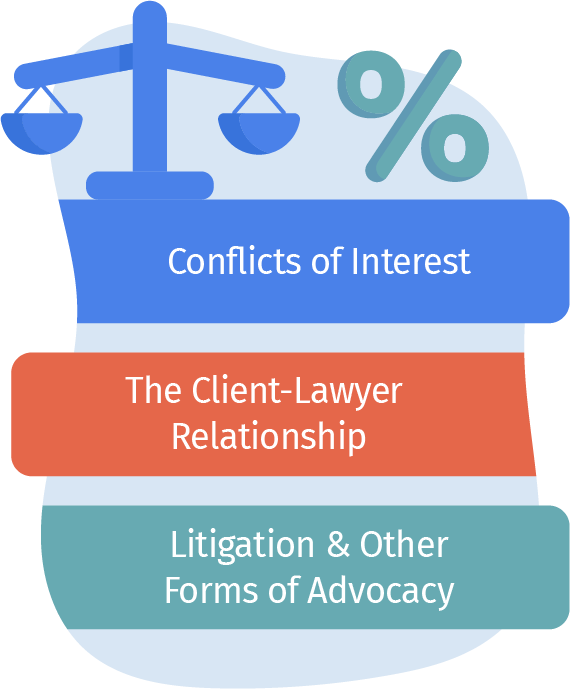
MPRE Study Guide – What You Need To Know
If you are looking for a study guide to walk you through everything you need to know about the MPRE, you have come to the right place. From understanding what the test is, what is on it, and last minute tips, we’ve got you covered.
Table of Contents
- What is the MPRE?
- Subject Matter Outline
- Key Words and Phrases
- Sample Test Questions
- Last Minute Tips
- Minimum Scores to Pass
What is the MPRE?

The Multistate Professional Responsibility Examination (MPRE) is an exam developed by the National Conference of Bar Examiners (NCBE) that is required before taking the bar. It consists of 60 multiple choice questions, and has a time limit of two hours. Administered three times a year, the MPRE has 50 scored questions and 10 unscored pretest questions that are not distinguishable from each other so examinees are encouraged to answer all questions.
If you haven’t signed up for the MPRE yet, learn more about it on our MPRE Registration Guide.
States Where it is Required
Not all states require the MPRE, but a majority of them do. The two jurisdictions that do not require the MPRE are Wisconsin and Puerto Rico. Below you will find all the jurisdictions that require the MPRE:
- Alabama
- Alaska
- Arizona
- Arkansas
- California
- Colorado
- Connecticut
- Delaware
- District of Columbia
- Florida
- Georgia
- Hawaii
- Idaho
- Illinois
- Indiana
- Iowa
- Kansas
- Kentucky
- Louisiana
- Maine
- Maryland
- Massachusetts
- Michigan
- Minnesota
- Mississippi
- Missouri
- Montana
- Nebraska
- Nevada
- New Hampshire
- New Jersey
- New Mexico
- New York
- North Carolina
- North Dakota
- Ohio
- Oklahoma
- Oregon
- Pennsylvania
- Rhode Island
- South Carolina
- South Dakota
- Tennessee
- Texas
- Utah
- Vermont
- Virginia
- Washington
- West Virginia
- Wyoming
- Guam
- Northern Mariana Islands
- Palau
- Virgin Islands
Subject Matter Outline

The subject matter covered in the MPRE ranges across 12 different topics. Understanding the percentage breakdown of each of the topics on the MPRE can help guide your studying strategy accordingly. It is important to note that not all topics will be tested on the MPRE. The three heaviest topics covered are “Conflicts of Interest”, “The Client-Lawyer Relationship”, and “Litigation and Other Forms of Advocacy”. The following is a brief rundown of the subject matter outline for the MPRE:
Regulation of the Legal Profession (6-12%)
Covering the professional responsibility of lawyers, this category covers things like admission into the profession, lawyer discipline, practicing in multiple jurisdictions, and restrictions.
The Client-Lawyer Relationship (10-16%)
The client-lawyer relationship topic, as the title states, focuses on the relationship between lawyers and their clients. Items like the formation of the relationship, communicating with the client, scope, and counsel will be tested on.
Client Confidentiality (6-12%)
Client confidentiality encompasses the principle of not revealing information about clients without reason or consent. Attorney-client privilege, work-product doctrine, general rule, disclosures, and exceptions are covered in this category.
Conflicts of Interest (12-18%)
Everything pertaining to conflicts of interest, like having multiple clients, personal interest, former client conflicts, business transactions, compensation and more are covered here.
Competence, Legal Malpractice, and Other Civil Liability (6-12%)
This topic covers the mental capacities of individuals to participate in legal matters, the mishandling of cases, or any legal obligations. Things like maintaining competence, exercising diligence and care, as well as limiting liability for malpractice are things to expect.
Litigation and Other Forms of Advocacy (10-16%)
Litigation and other forms of advocacy involves the resolution of disputes through representation of clients’ interests in court. Expect to see items like expediting litigation, candor to the tribunal, trial publicity, lawyer as a witness, and more.
Transactions and Communications with Persons Other than Clients (2-8%)
This topic covers communications with unrepresented and represented persons, respect for the rights of third person, and truthfulness in statements to others.
Different Roles of the Lawyer (4-10%)
The many different roles of the lawyer, such as an advisor, evaluator, negotiator, and more will be tested through this topic on the MPRE.
Safekeeping Funds and Other Property (2-8%)
The safekeeping of funds, including the establishment/maintenance of client trust accounts and other properties account for a smaller part of the exam.
Communications About Legal Services (4-10%)
The category of communications about legal services comprises of advertising, solicitation, referrals, and group legal services.
Lawyers’ Duties to the Public and the Legal System (2-4%)
The smallest topic of the MPRE goes over duties to the public and legal system by lawyers. This includes voluntary pro bono service, serving in legal services organizations, assisting judicial misconduct, and more.
Judicial Conduct (2-8%)
The conduct followed by persons who perform judicial functions involves items like maintaining the independence and impartiality of the judiciary, ex parte communications, and extrajudicial activities.
For a full view of the outline, check out the official NCBE MPRE Subject Matter Outline:
Key Words and Phrases

Understanding the key words and phrases on the MPRE will give you an upper hand on passing the test with flying colors. A few key words and phrases to brush up your knowledge on are:
- Attorney
- Lawyer
- Litigator
- Judge
- Managing Partner
- Subject to Discipline
- May
- Proper
- Subject to Litigation Sanction
- Subject to Disqualification
- Subject to Civil Liability
For an explanation of the different common key words and phrases above, be sure to check out this document put together by the NCBE:
Sample Test Questions

The NCBE has put together a document of 15 sample MPRE questions that are similar to those that you will find on the real test. Start off by studying these 15 sample questions to get a feel for the official exam.
Additionally, the NCBE has a simulated MPRE exam that has 60 practice questions that you can purchase for $45. Answer explanations, average time per question, and percent correct are provided with their simulated exam.
Last Minute Tips
If you are a few days away from taking the MPRE, here are a few last minute tips to supercharge your studying and mental focus for the exam. Walk into your test confident, knowing your mind knows the information and is ready to perform.
Practice Lots of Practice Questions
Volume is your friend when it comes to studying for the MPRE. Utilize the NCBE’s free sample test questions to get started. There are also multiple free MPRE review courses that you can find online.
Use the Subject Matter Outline to Your Advantage
The MPRE Subject Matter Outline is provided by the NCBE, which means you can trust that the exam will follow that. Use the outline to your advantage by studying areas you aren’t strong in, as well as studying topics that have a higher chance of showing up. This doesn’t entail forgoing studying of the smaller topics. Instead, use your time wisely and strategize a study routine that will help you cover the highly tested categories.
Get a Sufficient Amount of Sleep the Night Before
The last thing you want is to be tired during your exam, which could cause you to misinterpret prompts and answer them incorrectly. Getting enough sleep will help your mind and body function at its best, so ensure you get the recommended 7-9 hours of sleep.
Eat a Hearty Breakfast and Hydrate
On the day of your test, you will want to make sure you eat a healthy meal and drink enough water to keep your mind sharp. Research has proven that better exam performance can be expected from eating a hearty breakfast, due to the nutrients consumed.
Familiarize Yourself with the Key Words and Phrases
The key words and phrases on the MPRE guide the way questions are asked. Understanding these words and phrases, especially with the document created by the NCBE will help you point them out on the exam.
Read the Prompts Closely
Related to the tip above, read the prompts closely so you know exactly what is being asked. You can highlight key words and phrases to help you find the right answer for each prompt. By understanding the prompt, you will be able to quickly eliminate answer choices that don’t align.
Think Like a Lawyer
When you are unsure of an answer on the exam, it is best to put your mind into the shoes of a lawyer. Ask yourself, “What would a lawyer do?”, since the test focuses on the behaviors of attorneys.
What’s the Minimum Score to Pass?

The minimum passing score for the MPRE depends on the jurisdiction that you take the exam. The range of scaled scores ranges from 75 up to 86. Correctly answering between 30 to 35 questions should put you in the right spot to pass the exam.
| State | Minimum Score |
| California, Utah | 86 |
| Arizona, Arkansas, Colorado, Delaware, Hawaii, Idaho, Maryland, Michigan, Minnesota, Nebraska, Nevada, New York, North Dakota, Ohio, Oregon, South Dakota, Texas, Virginia, Washington | 85 |
| Tennessee | 82 |
| Alaska, Connecticut, Florida, Guam, Illinois, Indiana, Iowa, Kansas, Louisiana, Maine, Massachusetts, Missouri, Montana, North Carolina, Rhode Island, Vermont, West Virginia, Northern Mariana Islands | 80 |
| New Hampshire | 79 |
| South Carolina | 77 |
| Alabama, District of Columbia, Georgia, Kentucky, Mississippi, New Jersey, New Mexico, Oklahoma, Pennsylvania, Palau, Virgin Islands | 75 |
Once you have passed the MPRE, take a break to celebrate! Afterwards, you will be ready to start preparing for the bar exam. Make sure to check out our free MBE practice tests and our premium BarPrepHero program to help you pass the bar.
